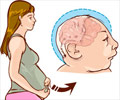Oral cleft defects (cleft lip and cleft palate) are among the most common type of birth defects, affecting thousands of infants each year.
They arise at some point between the fifth and ninth week of pregnancy, when the tissues that form the roof of the mouth and the upper lip fail to fuse properly.The causes of oral clefts are still unclear but a combination of genetic predisposition and environmental factors seems to be the contributing factors.
Previously in smaller studies and in animal models, it was implicated that corticosteroid, which are widely used for eczema, asthma, other allergies and autoimmune diseases like rheumatoid arthritis, and multiple sclerosis can cause the oro-facial cleft defects. A similar risk in humans is still unclear.
This study, lead by Dr. Anders Hviid from Statens Serum Institute of Copenhagen, Denmark gathered at data on 832 636 live births over the study period of 12 years (1996 to 2008).
Study reports suggest that among more than 800,000 babies born in Denmark, there was no clear association between mother’s use of corticosteroids during pregnancy and the risk of oral clefts. During the study period, among 832,636 live births there were 1,232 cases of cleft lip or cleft palate. In all 6 % of mothers used corticosteroids (topical, inhaled, oral or nasal-spray forms) during the first trimester.
"No drug can be proven 100 percent safe during pregnancy but our study supports that a large increase in cleft risk can be excluded. This should reassure pregnant women", said Dr. Hviid, the lead researcher.
Dr. Ditte Mølgaard-Nielsen, co-author of the study reports, “Women who used any corticosteroid during the first trimester were not significantly more likely to have a baby with a cleft defect than women who did not use any corticosteroid during the first trimester." He further added, “However, the use of dermatologic corticosteroids was associated with an increased risk of cleft lip with or without cleft palate."
However, the findings are only indicative and do not prove that there is absolutely no risk at all but it does offer women some reassurance about their needed medications.
Dr. David Beuther, a Pulmonologist at National Jewish Health in Denver, was not involved in the study, agreed that the findings are reassuring. "It goes along with what we've thought about the safety of steroids" he said. However, Dr. Beuther still seemed worried, as the study does not address whether corticosteroids might be related to some “other type of birth defect”? "We don't know that they are harmful, but we can't say that they are completely safe either," he pointed out.
Dr. Hviid agrees to this and suggested that women, who have concerns, must speak with their doctor even if they are on the lowest dose of corticosteroid needed to control their condition.
Reference Article
http://www.cmaj.ca/cgi/content/full/183/7/796
Source-Medindia















